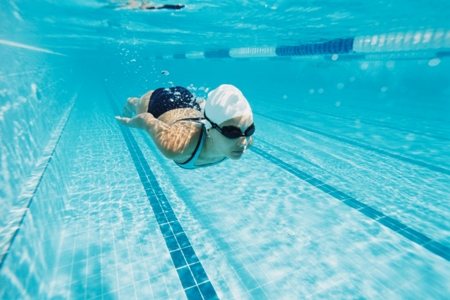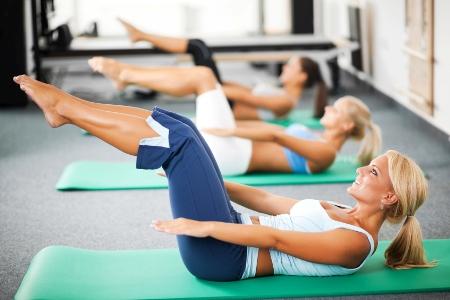Many women, having given birth to a baby, think about returning their figure to its previous state. During breastfeeding, diets are contraindicated, but you want to get rid of extra pounds. Sports during breastfeeding can solve such problems. However, a young mother needs to know which sports to give preference to and which to temporarily abandon.
Sports and lactation
As you know, playing sports is a physical activity on the body. You can exercise with varying degrees of intensity: reach the point of exhaustion during training or enjoy the exercise. Of course, only the last option is suitable for a nursing mother.
In previous years, it was believed that physical activity led to the body releasing lactic acid. And it can affect the taste of milk, as a result of which the baby will refuse it. Modern research shows that an increase in the amount of lactic acid caused by physical activity does not affect the taste of milk.
If a mother wants to play sports professionally while breastfeeding, she will have to spend many hours training every day. In such a situation, we can say that sports are harmful for lactation. In this case, milk may disappear both due to exhaustion of the body, and due to the fact that during training the woman will not be able to breastfeed the baby, which can lead to a decrease in the amount of milk.
Experts believe that during lactation, a mother can go to the gym 2-3 times a week and work out there for 40 minutes. Such activities will not harm Guards. Exercises can be done every day.
Joint sports with a baby
If you can't train while your child is sleeping, you can train with him. The most common options for exercising with a child are exercises on a fitball or when the baby is in a sling. The range of exercises is wide, and every mother can choose what suits them. But there are general rules that must be followed when working with a baby.
- Do not start activities immediately after feeding to avoid regurgitation of food by the baby.
- The baby must be securely secured and his head must have sufficient support.
- All movements must be smooth and measured.
- The child must be in a good mood.
- Avoid jumping, running, and strength exercises.
Sports suitable for a nursing mother
As already mentioned, you can play sports while breastfeeding your baby. But it is necessary to choose the most suitable sports for a nursing woman. The following sports activities are best suited for postpartum training:
- Exercises in the gym. They will allow the muscles to regain their former tone and return the body to its former beauty.
- Swimming. In the pool, a young mother can relax, which will have a positive effect on her state of mind. In addition, swimming is very useful, since it uses all muscle groups. Water aerobics improves blood circulation and strengthens the back muscles.
- Fitness. This sport helps strengthen the body as a whole, since it is based on general developmental exercises that allow you to develop strength, coordination and endurance. You should start with light exercises and only then increase the load and pace.
- Pilates. Classes can speed up the recovery of a young mother’s abdominal muscles after childbirth and help strengthen the spine and pelvic muscles.
- Yoga. Yoga classes during lactation will help normalize the mother’s emotional state and normalize her sleep. Performing a special set of exercises will make it possible to tighten the muscles of the hips and chest, and also strengthen the back muscles.
- Walking. Long walks train the heart muscle and speed up the metabolism.

Features of breastfeeding and its effect on the female body
Breastfeeding is a natural continuation of pregnancy and childbirth. The World Health Organization (WHO) and the United Nations Children's Fund (UNICEF) say that breast milk is the optimal food for babies, as it contains all the nutrients necessary for their health, as well as antibodies that help protect children's immunity.
The benefits of breastfeeding for the female body
For a young mother, breastfeeding (hereinafter referred to as breastfeeding) is no less beneficial than for a baby. So what are its natural benefits?
- GW promotes rapid recovery of the body after childbirth.
When breastfeeding, a woman produces the hormone oxytocin, which accelerates the healing process of the uterus, lowers blood pressure, stops bleeding (the so-called lactational amenorrhea, which occurs due to the production of the hormone prolactin, which suppresses the onset of ovulation and menstruation) and, as a result, prevents the development of anemia.
- GW strengthens the immune system.
It also reduces the risk of developing serious diseases such as cancer (especially of the ovaries, uterus and mammary glands), cardiovascular diseases (blood pressure levels are stabilized, the level of bad cholesterol in the blood is reduced), uterine infections, diabetes mellitus, osteoporosis (at this time period calcium is better absorbed by the body), multiple sclerosis, rheumatoid arthritis.
Subscribe to “Marathon Man” on Telegram. Announcements of articles and useful selections every week.
In addition, most women do not have problems with mastopathy. All this occurs due to the smoothing of metabolic changes that occurred during pregnancy, as well as due to the absence of monthly fluctuations in hormonal status and the onset of lactational amenorrhea.
- Breastfeeding reduces stress and the risk of postpartum depression.
In response to feeding, a woman’s body produces “hormones of joy” - endorphins. Therefore, the more a mother breastfeeds her baby, the better she feels.
- GW promotes greater calorie consumption and burning of fat in problem areas.
On average, the body spends about 500 kcal per day to produce milk. Also during lactation, a change in metabolism occurs, which promotes the “burning” of fat in the abdomen, hips and shoulders. This feature is explained by an increase in the activity of the lipase enzyme in these areas.
Many mothers who are thinking about resuming or starting running training fear that this sport may disrupt their lactation capabilities or, even worse, nullify this process. Next, we will talk about a generational myth that is firmly lodged in the heads of our grandmothers and great-grandmothers, who are inclined to consider sports and breastfeeding to be incompatible processes.
Sports that are not suitable for a nursing mother
Not all sports activities may be beneficial for a breastfeeding woman. During lactation it is better to refrain from the following sports:
- Aerobics and step. These sports and lactation do not go together because they are based on impact exercises. There are also a lot of jumps performed. During training, the mother's body can lose too much energy. There is also a risk of chest injury.
- All types of struggle. There is a risk of chest injury during such activities.
- Strength sports. Breastfeeding mothers should not lift barbells or heavy dumbbells, as such exercise is extremely energy-intensive and can lead to a decrease in milk supply.
- Athletics. There are different opinions about the combination of lactation and this sport. Many doctors believe that running causes the chest to fluctuate a lot, which can lead to injury, and therefore are against such activities. Others suggest that with the right underwear, a woman can run for about 30 minutes every day.
So why running?
As for me, I got “infected” with running after reading Haruki Murakami’s “What I Talk About When I Talk About Running.” After that, 9 months later, I ran my first marathon, achieved amenorrhea, but ended up getting pregnant. During this time I never got sick and felt great. Therefore, being pregnant, I kept waiting for when I could return to my favorite activity. In general, everything is clear with me. We became close friends with running, I felt all the delights of this sport, and I don’t want to part with it anymore.
Why might running interest you? There are probably several arguments:
- Unlike fitness rooms and group classes, you are independent in time. You can run in the morning, and in the evening, and during the day, and at night.
- You don't need an instructor or special training to run. You can start small.
- It's practically free! Except for a pair of sneakers and running gear (if desired).
- You can even run with a stroller!
- While running, you will have the opportunity to think about your plan for the day, some pressing issues, or just relax and be alone with yourself.
- A change of scenery and the feeling that you are running, you are in shape, cause a feeling of joy and self-satisfaction, which is so necessary for young mothers.
- Running is simply terribly useful: cleansing the body, improving heart function, normalizing blood pressure, stimulating the digestive system, normalizing hormonal levels, reducing the volume of adipose tissue, reducing the risk of heart attack, stroke, diabetes and lung cancer, strengthening the immune system, developing general endurance, improving blood circulation in the body. pelvis, which serves as a guarantee of longevity in the “intimate” sphere of life, accelerating blood circulation, it also affects a person’s life expectancy.
But to experience all this, first you need to at least try. And here the next question arises:
When can I start classes?
Only a doctor can tell you when you can start playing sports. This is especially important if the baby was born via caesarean section. The doctor must confirm that the sutures will not come apart. If the stitches have not yet been removed, you cannot practice.
In the first few days after birth, mommy can perform the simplest postpartum gymnastics (for example, the Kegel complex).
Exercises aimed at strengthening muscles and burning excess calories can be done approximately two months after childbirth, if they occurred without complications. By this point, the muscles of the peritoneum and uterus will return to normal, which will allow you to play sports without the risk of harming your internal organs. Until this time, excessive stress on the abdominal muscles can significantly worsen a woman’s health.
If a young mother has undergone a caesarean section, she can begin training only four months after the procedure.

Contraindications
As already mentioned, the question of whether a young mother can play sports while breastfeeding should be decided by a doctor. The doctor may prohibit classes in a number of cases:
- Difficult birth and protracted recovery process.
- Infectious diseases.
- Some non-communicable diseases.
When playing sports, a young mother should monitor her condition and not overexert herself. If her hemoglobin level is low, she gets very tired or often experiences dizziness, it is better to temporarily postpone classes.
The benefits of playing sports
Exercising while breastfeeding has a positive effect on a woman:
- Improves the general condition of the body. The muscles become toned, the spine is strengthened, and the activity of the heart is activated. This helps the young mother become more resilient and less tired from caring for the baby.
- They stimulate biological processes occurring in tissues (including the process of milk formation).
- Normalizes emotional state. Women who play sports become happier and calmer. It is known that the nervous state of the mother is transmitted to the baby.
- Allows you to restore your former attractiveness. And this, in turn, brings self-confidence.
- They provide an opportunity to escape from everyday life. At the same time, they also organize the daily routine.

Precautionary measures
Young mothers should play sports, adhering to a number of simple rules:
- Select exercises aimed not only at stressing the body, but also at relaxing it.
- Maintain water balance. A nursing mother should drink enough fluids.
- Choose the right time to study. A woman should not miss feedings due to training, as this will negatively affect breastfeeding. It is best to exercise 1.5-2 hours before feeding or immediately after it.
- Take care of your breasts. Nursing mothers should avoid any injuries to the mammary glands, as they can lead to lactostasis and other breastfeeding problems.
- Start with small loads, which can be increased later. It is best to initially train under the guidance of an instructor, and only then begin independent training.
- Don't overexert yourself. After finishing the lesson, a woman should feel not exhausted, but full of strength. Excessive stress will have a bad effect on her condition and will reduce the amount of breast milk, which will not affect the baby for the better.
- Eat properly. Mom should not lack food, as this will affect milk production and her general condition.
- Choose a suitable sport.
- Maintain hygiene. During physical activity, a person produces sweat. Its prolonged presence on the mammary glands can cause inflammation, which will interfere with feeding.
- Do not perform exercises for the chest muscles. They can lead to inflammation in the tissues of the mammary glands. Exercises in which the chest is subjected to strong vibration (running, jumping, etc.) are also not suitable.
Women who played sports during guarding noted the positive impact of exercise on both their physical and emotional well-being. Sport helps restore your figure to its previous state and improves the mood of a young mother. However, it should be remembered that the loads should be moderate, not exhausting, and bring only positive emotions.
Who should not run after giving birth under any circumstances?
The women who decided to run are great fellows. However, before buying good sneakers, you should make sure there are no contraindications. Running does not allow:
- arthritis or other diseases directly related to injuries to the knee or hip joints;
- cardiovascular disorders;
- varicose veins, phlebitis or thrombosis;
- obesity or flat feet.
Also, running is not recommended for women who have just given birth. It is believed that a woman in labor should wait at least three months. The same warning applies to those who are breastfeeding. The likelihood that the milk may “go away” or become bitter is extremely high.

This is interesting
- [uaf_vkcount url='https://beginogi.ru/mozhno-li-vo-vremya-mesyachnyih-begat-na-chto-obratit-vnimanie/']
Is it possible to run during menstruation, what should you pay attention to?
- [uaf_vkcount url='https://beginogi.ru/beg-pri-beremennosti-trenirovki-vo-vremya-beremennosti/']
Running during pregnancy, training during pregnancy









